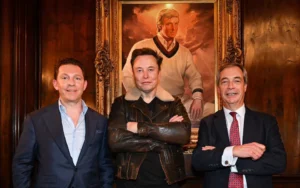I wonder if Labour’s governing generalissimos, Morgan McSweeney and Pat McFadden, watched much Christmas telly this year. They might have recognised the strong manly relationship at the heart of Gone Fishing on Christmas Eve. Or shed a tear watching the community spirit infusing Gavin & Stacey: The Finale. But I’m not sure they will have caught the one with the most important lesson about modern life and government today. No, not Die Hard: Tiddler.
In this adaptation of Julia Donaldson’s children’s book, an imaginative little fish is saved by the “tall tales” he makes up to keep him out of trouble. “I was lost, I was scared, but a story led me home again,” he declares. Donaldson describes her story as a celebration of childhood imagination, which encourages kids to lose themselves in their dreams. Yet it strikes me that there’s something deeper going on. Donaldson has written a modern fable of sorts. Across the West, we are more than a little lost. The stories we once told are no longer believed and those we need to tell new ones have lost their power of imagination.
The central conceit of much political analysis today is that there is something called “populism” which tells tall tales to gullible voters in order to win power. Opposing the populists, in this telling, are the “centrists” who deal in facts and figures. We might call this the Alastair Campbell account of modern politics. The irony of this view, though, is that it has become the very thing it thinks it opposes: a comforting but ultimately hollow fantasy.
In one sense, it is possible to understand 2024 as the year the hollowness of this centrist fantasy became so obvious voters couldn’t take it seriously any longer. In France, the story of Emmanuel Macron’s Jupiterian competence is no longer believable even for those who want it to be true. In Germany, meanwhile, the idea that Olaf Scholz could possibly lead a Zeitenwende looks just as ridiculous, as he clings to power desperately casting his opponents as warmongers. In the United States, meanwhile, the extraordinary reality is that Donald Trump cut the more substantive figure in their presidential election than his opponent by having actual policies. Has there ever been a more vacuous candidate in modern presidential history than Kamala Harris? Is anyone today able to say what she actually stood for other than her own ambition and the interests of the Democratic Party?
Here in Britain, meanwhile, the hollowness of our order is exposed by the simple fact that it is simply no longer believable that we are a well-governed country. The deterioration of living standards and public services are too obvious for anyone to be able to make this case with any degree of sincerity. However we define the status quo, it is surely failing. The last time there was a similar breakdown of the legitimacy in our governing order came in the Seventies when a series of crises exposed its failings. For Starmer and his government, the great fear is that the turning point in this story — the 1979 of our own era — was not the election in July, but the one yet to come.
Part of our current dilemma lies in the fact that our world no longer bears witness to the wisdom of the old solutions. On economic questions, for example, the idea of free trade in the era of Chinese industrial power looks increasingly sado-masochistic, especially when shackled to our drive towards Net Zero. There is real panic today in Whitehall at the prospect of imminent industrial collapse which risks fracturing the entire governing consensus around our decarbonising commitment — much as the post-Brexit immigration boom under Boris Johnson similarly robbed the Conservative Party of its legitimacy on that subject.
Standing ready to benefit on both of these counts is Nigel Farage, the populist Grendel stalking Westminster’s imagination. Johnson was once the figure who was supposed to have slayed this Kentish monster with his promise to Get Brexit Done and “level up” the country, only for the hollowness of his commitment to be exposed, allowing Farage to return stronger than ever. Since then, Liz Truss and Rishi Sunak have come and gone, each slain by their own inadequacies, leaving Starmer with the sword of state tasked with defending the Mead Hall. But within a matter of months, his government is also in trouble.
With his noble missions as his guide, Starmer hopes to demonstrate to voters that he can deliver tangible improvements to their lives in a way that the populists Boris Johnson and Liz Truss never could. The strategy behind this is to paint Farage not as the solution to today’s crisis of government, but as a return to the populist chaos of the Tories. There is merit in this approach, but in the end, if a wave of car plant closures is blamed on Ed Miliband’s drive to Net Zero, the debates about Liz Truss, Boris Johnson and George Osborne will feel as irrelevant as the figure of Ted Heath did in the aftermath of 1979’s Winter of Discontent.
The danger for Starmer is that trying to defeat populism through “delivery” not only leaves him at the mercy of forces he cannot control, but also ties him inextricably to a system that voters have already rejected. This, in a sense, was the story of the American election, in which a party with an apparent record of delivery was defeated by an insurgent populist. To win, Starmer needs more than a spreadsheet with the figures moving in the right direction. He needs a story about what went wrong before and why his government is different. He needs a story about what his government is for, morally and ideologically.
Unfortunately for Starmer, there is a concurrent shift in attitudes across the Western world which Starmer also needs to contend with. As a senior diplomat put it to me, the mood in European capitals has dramatically shifted since Trump’s victory, embracing his power in a way that indicates a new and far more cynical Western zeitgeist. “So many have now embraced the world of Game of Thrones, Billions and Succession,” this official said. “A world in which power is the only currency and morality is most likely to be a flaw.”
In this view, to be seen attempting to play by the rules of the game while everyone else takes advantage of you is not noble, but contemptible. Having recently found myself invested in the TV series Yellowstone, this observation struck me as highlighting a key element of our modern psyche. In Yellowstone, the anti-hero is the patriarch of the family doing everything and anything to keep hold of his family ranch. Much has been said about Yellowstone’s distinctly conservative vision of America. Yet, in a more profound way, it is actually offering a vision propounded by the Left, which long ago rejected the idea of a noble America born in liberty seeking an ever-more-perfect union. Instead, America was cast — correctly in many ways — as a slave republic which came into existence through violent colonisation.
The irony here, though, is that this successful challenge to the foundational myth of America has given rise not to some pained wish to repent among today’s newly enlightened generation, but a deep cynicism about the nature of the world, which has only served the interests of the Right. If there has never been a moral mission in the world — if it is all just a made-up story — then why create one now? Might is right, after all. No matter how many people the patriarchal rancher must kill to keep his land — or what was done to win it in the first place — he remains the hero simply by dint of striving to keep what is his.
This story does not bode well for those like Starmer who are seeking to defend the decency of the old order. In this world, little is to be gained by giving away sovereignty in the Indian Ocean or sticking to your climate commitments. What voters want, it seems, is for someone to protect their inheritance; their prosperity; their country; their land. Of all the characters in British politics, the one who clings closest to the Yellowstone version of morality is, of course, Farage. The point about Net Zero, for him, is not who is to blame for climate change, but who is going to defend British prosperity.
If Starmer or, indeed, Kemi Badenoch, is to counter this story of modernity, then both will need a better story than the one they are telling us. It will need to capture the public’s imagination as much as Farage’s tale; to explain, in moral and ideological terms, what has gone wrong and why only Labour can fix it. It will need to explain the collapse of the old order’s legitimacy and work with the cynicism of our new age. Ultimately, it will need to be more political: to be for some people and against others. McSweeney and McFadden need a new story. It can be tall or otherwise, but it can no longer be as hollow as the one we have lost faith in, otherwise we will not find our way back.
Disclaimer
Some of the posts we share are controversial and we do not necessarily agree with them in the whole extend. Sometimes we agree with the content or part of it but we do not agree with the narration or language. Nevertheless we find them somehow interesting, valuable and/or informative or we share them, because we strongly believe in freedom of speech, free press and journalism. We strongly encourage you to have a critical approach to all the content, do your own research and analysis to build your own opinion.
We would be glad to have your feedback.
Source: UnHerd Read the original article here: https://unherd.com/



